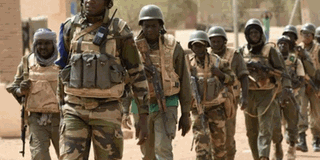Dozens killed in central Mali jihadist-hunter clashes

Authorities in Mali say they are heightening security operations to prevent further dangerous situations. PHOTO/FILE/COURTESY
What you need to know:
- The ethnic mosaic of central Mali has become one of the conflict's hot spots, where fighting between jihadists, traditional hunters and pastoralists is common.
About 40 people have been killed in recent clashes between jihadists and traditional hunters, the government of central Mali's Mopti region said Monday, with the fighting displacing around 1,000 people.
The war-torn region's government said in a statement that clashes began with a dispute between two brothers, one a traditional hunter and the other an alleged jihadist.
The fighting between central Mali's main towns of Mopti and Djenne left about 20 dead on both sides, the statement added. Army reinforcements have been dispatched to the area.
A Malian security official who requested anonymity told AFP that the clashes broke out after the hunters decided to "take back" rice which jihadists had collected as taxes.
AFP was unable to independently confirm the details.
Sidiki Diarra, spokesman for a group of traditional hunters in the area, said the clashes began on April 12.
"We lost many hunters (and) the survivors have moved to neighbouring villages," he said.
Islamist militants launched an insurgency in northern Mali in 2012, stoking a conflict that has since spread to the centre of the country and neighbouring Burkina Faso and Niger.
The ethnic mosaic of central Mali has become one of the conflict's hot spots, where fighting between jihadists, traditional hunters and pastoralists is common.
Violence in the region began to increase in 2015 after a firebrand Fulani preacher named Amadou Koufa established an Al-Qaeda-aligned jihadist group, which fed ethnic tensions.
So-called self-defence groups made up of traditional hunters were formed in response, but they have been accused of carrying out ethnically motivated attacks on Fulani people.




